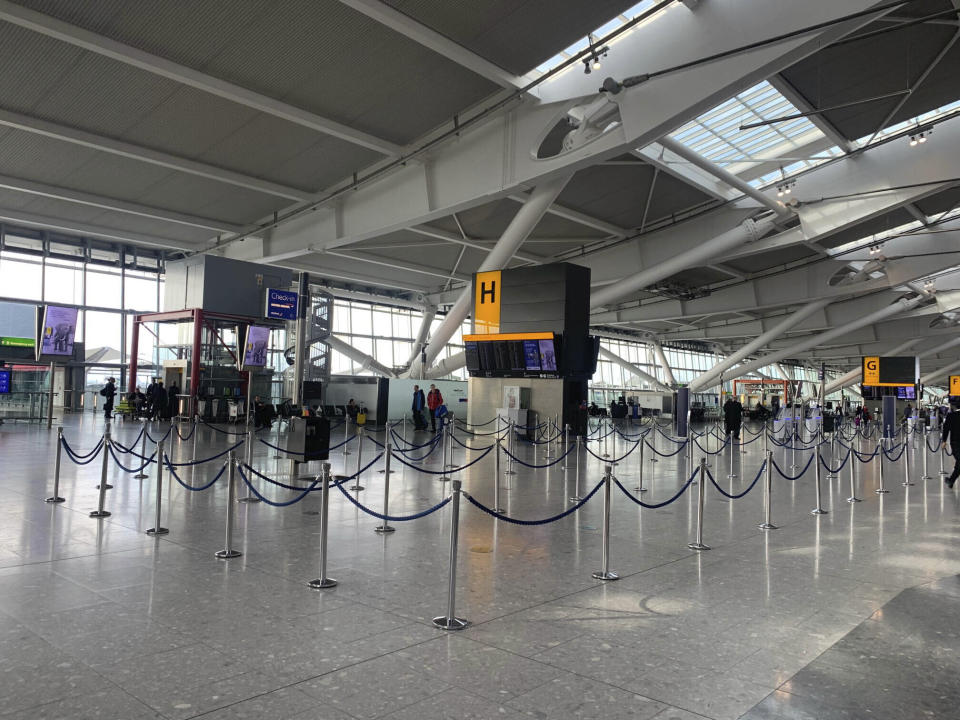Stock sell-off shows every industry will feel coronavirus cost

The FTSE 100 suffered its worst day since 1987 on Thursday, as fears about the economic impact of coronavirus continue to batter investor confidence.
Thursday’s broad-based sell-off — no FTSE 100 (^FTSE) companies made gains — could easily be written off as panic, with investors taking a “sell now, ask questions later” approach in the wake of President Donald Trump’s surprise European travel ban.
But the worst hit stocks tell a story: the coronavirus, and efforts to contain it, are having a chilling effect across almost all parts of the economy. Thursday is arguably the day the impact became tangible, as a slew of UK companies directly warned coronavirus was hurting their business.
Finablr, the owner of Travelex, warned it’s facing a cash crunch, in part driven by lower demand for travel money as coronavirus puts people off going abroad.
Newsagents WH Smith said slow business at airports and train stations would hit profits by as much as £40m ($51m).
Cinema chain Cineworld (CINE.L) said a worst-case scenario coronavirus outbreak could put it out of business; and house builder Berkeley (BKG.L) cancelled a £450m shareholder reward scheme, citing coronavirus uncertainty.
“The impact of the coronavirus is now becoming very apparent among a large number of companies,” said Russ Mould, investment director at stockbroker AJ Bell.
The biggest fallers on the FTSE 100 also highlight the real economic impact. As of just before 3.30pm on Thursday afternoon, the five biggest fallers on the FTSE 100 were:
Carnival (CCL.L) — down 18%: Headlines about coronavirus outbreaks on cruise ships have led to slumping demand for holidays at sea. Carnival subsidiary Princess Cruises has had outbreaks on two of its ships and said Thursday it would suspend operations of 18 ships for two months.
Barclays (BARC.L) — down 17.2%: Recent downgrades to global growth forecasts raise the prospect of rising default rates, which could hit banks’s bottom lines. Barclays faces a double whammy as it has a significant investment banking operation, unlike many other British rivals. The recent market turmoil could leave Barclays facing inflated trading losses and corporate deal making activity is said to be drying up.
Centrica (CNA.L) — down 17.2%: Amidst the coronavirus crisis, Saudi Arabia decided this week to launch an oil price war against Russia. The move sent oil prices crashing 30% on Monday. That will put downward pressure on British Gas-owner Centrica’s prices. The company also has an oil production arm that it is in the process of divesting, which will now face lower revenues will costs stay the same.
Tui (TUI.L) — down 16.8%: The knock-on effects of President Trump’s travel ban for German travel operator Tui are fairly obvious: less business. However, the travel industry was already under pressure given slumping demand in the face of COVID-19. The prospect of further lockdowns around the world don’t help either. The Republic of Ireland is the latest nation to put its population on partial lockdown.
Prudential (PRU.L) — down 16.8%: The flight to safety in financial markets has pushed the yield on government bonds to record lows. That’s bad news for insurance and pensions giant Prudential, which invests in a lot of long-dated bonds to backup the policies it writes. The financial giant will likely now have to invest more money to try and secure the required cash at a later date.
Just outside the top five, other major fallers included:
Anglo American (AAL.L) — down 15.5%: The mining giant was down on fears that a slowing global economy will mean fewer raw materials consumed. Other commodity companies like Evraz (EVR.L) and Glencore (GLEN.L) were facing similar slumps.
Whitbread (WTB.L) — down 15.5%: While the US travel ban doesn’t include the UK, President Trump’s message is likely to have an even greater chilling effect on the tourism industry. It could translate into lower demand for Whitbread, which owns the Premier Inn chain of hotels.
Flutter Entertainment (FLTR.L) — down 15.2%: The remainder of the NBA basketball season has been called off and the ATP Tennis Tour has been suspended for six months. The Real Madrid football team are also in quarantine, throwing their Champion’s League fixture next Tuesday into doubt. All of this is bad news for Flutter, the betting giant behind Paddy Power.
Barratt Developments (BDEV.L) — down 13.8%: The UK is said to be on the brink of mandating social isolation in a bid to stop the spread of COVID-19. Such measures would almost certainly bring an end to house viewings and could stop the construction of new homes, which is bad news for house builder Barratt.
Rolls-Royce (RR.L) — down 12%: Rolls-Royce’s main business is building engines for airplanes. Manufacturers like Airbus (AIR.PA) were already said to be considering production cuts prior to Wednesday’s travel ban announcement. Cut backs now look likely.
All of these companies underline the very real economic toll coronavirus is taking.
Fear of catching coronavirus abroad is hitting hotels, airlines, tourist attractions, and the businesses that supply them.
Cancelled concerts and sports games are hitting organisers, TV companies who broadcast them, and betting firms that make markets on them.
Uncertainty about how long emergency measures will last discourages investment and deal making, hurting everyone from investment bankers to steel producers.
The next steps in containing the virus in the UK will hurt the economy too. Lock downs and social distancing will mean fewer people going to cafes, shops, and bars. Factories and building sites could lie empty.
All of that combined means the entire economy grinds slower.
“For anyone in London, it does feel like some of the commuter trains are less busy, so too gyms and swimming pools,” Mould said. “Daily activity is being affected by more people working or staying at home. One can only assume this trend is emerging across the rest of the country.”
Watch the latest videos from Yahoo UK

 Yahoo Finance
Yahoo Finance 